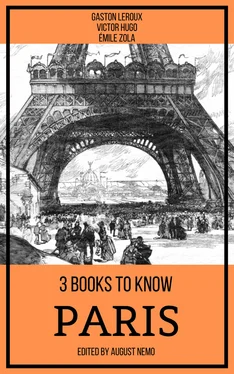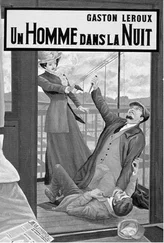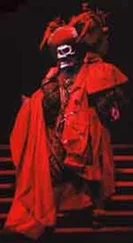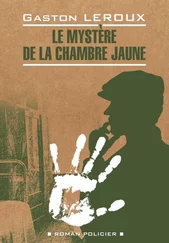“Monsieur,” said the archdeacon, in a cold tone, “I am greatly displeased with you.”
“Alas!” sighed the scholar.
Dom Claude made his arm-chair describe a quarter circle, and gazed intently at Jehan.
“I am very glad to see you.”
This was a formidable exordium. Jehan braced himself for a rough encounter.
“Jehan, complaints are brought me about you every day. What affray was that in which you bruised with a cudgel a little vicomte, Albert de Ramonchamp?”
“Oh!” said Jehan, “a vast thing that! A malicious page amused himself by splashing the scholars, by making his horse gallop through the mire!”
“Who,” pursued the archdeacon, “is that Mahiet Fargel, whose gown you have torn? Tunicam dechiraverunt, saith the complaint.”
“Ah bah! a wretched cap of a Montaigu! Isn’t that it?”
“The complaint says tunicam and not cappettam. Do you know Latin?”
Jehan did not reply.
“Yes,” pursued the priest shaking his head, “that is the state of learning and letters at the present day. The Latin tongue is hardly understood, Syriac is unknown, Greek so odious that ‘tis accounted no ignorance in the most learned to skip a Greek word without reading it, and to say, ‘Groecum est non legitur.’”
The scholar raised his eyes boldly. “Monsieur my brother, doth it please you that I shall explain in good French vernacular that Greek word which is written yonder on the wall?”
“What word?”
“‘ANANKE.”
A slight flush spread over the cheeks of the priest with their high bones, like the puff of smoke which announces on the outside the secret commotions of a volcano. The student hardly noticed it.
“Well, Jehan,” stammered the elder brother with an effort, “What is the meaning of yonder word?”
“FATE.”
Dom Claude turned pale again, and the scholar pursued carelessly.
“And that word below it, graved by the same hand, ‘Ayáyvela, signifies ‘impurity.’ You see that people do know their Greek.”
And the archdeacon remained silent. This Greek lesson had rendered him thoughtful.
Master Jehan, who possessed all the artful ways of a spoiled child, judged that the moment was a favorable one in which to risk his request. Accordingly, he assumed an extremely soft tone and began,—
“My good brother, do you hate me to such a degree as to look savagely upon me because of a few mischievous cuffs and blows distributed in a fair war to a pack of lads and brats, quibusdam marmosetis? You see, good Brother Claude, that people know their Latin.”
But all this caressing hypocrisy did not have its usual effect on the severe elder brother. Cerberus did not bite at the honey cake. The archdeacon’s brow did not lose a single wrinkle.
“What are you driving at?” he said dryly.
“Well, in point of fact, this!” replied Jehan bravely, “I stand in need of money.”
At this audacious declaration, the archdeacon’s visage assumed a thoroughly pedagogical and paternal expression.
“You know, Monsieur Jehan, that our fief of Tirechappe, putting the direct taxes and the rents of the nine and twenty houses in a block, yields only nine and thirty livres, eleven sous, six deniers, Parisian. It is one half more than in the time of the brothers Paclet, but it is not much.”
“I need money,” said Jehan stoically.
“You know that the official has decided that our twenty-one houses should he moved full into the fief of the Bishopric, and that we could redeem this homage only by paying the reverend bishop two marks of silver gilt of the price of six livres parisis. Now, these two marks I have not yet been able to get together. You know it.”
“I know that I stand in need of money,” repeated Jehan for the third time.
“And what are you going to do with it?”
This question caused a flash of hope to gleam before Jehan’s eyes. He resumed his dainty, caressing air.
“Stay, dear Brother Claude, I should not come to you, with any evil motive. There is no intention of cutting a dash in the taverns with your unzains, and of strutting about the streets of Paris in a caparison of gold brocade, with a lackey, cum meo laquasio. No, brother, ‘tis for a good work.”
“What good work?” demanded Claude, somewhat surprised.
“Two of my friends wish to purchase an outfit for the infant of a poor Haudriette widow. It is a charity. It will cost three forms, and I should like to contribute to it.”
“What are names of your two friends?”
“Pierre l’Assommeur and Baptiste Croque-Oison*.”
* Peter the Slaughterer; and Baptist Crack-Gosling.
“Hum,” said the archdeacon; “those are names as fit for a good work as a catapult for the chief altar.”
It is certain that Jehan had made a very bad choice of names for his two friends. He realized it too late.
“And then,” pursued the sagacious Claude, “what sort of an infant’s outfit is it that is to cost three forms, and that for the child of a Haudriette? Since when have the Haudriette widows taken to having babes in swaddling-clothes?”
Jehan broke the ice once more.
“Eh, well! yes! I need money in order to go and see Isabeau la Thierrye to-night; in the Val-d’ Amour!”
“Impure wretch!” exclaimed the priest.
“Avayveia!” said Jehan.
This quotation, which the scholar borrowed with malice, perchance, from the wall of the cell, produced a singular effect on the archdeacon. He bit his lips and his wrath was drowned in a crimson flush.
“Begone,” he said to Jehan. “I am expecting some one.”
The scholar made one more effort.
“Brother Claude, give me at least one little parisis to buy something to eat.”
“How far have you gone in the Decretals of Gratian?” demanded Dom Claude.
“I have lost my copy books.
“Where are you in your Latin humanities?”
“My copy of Horace has been stolen.”
“Where are you in Aristotle?”
“I’ faith! brother what father of the church is it, who says that the errors of heretics have always had for their lurking place the thickets of Aristotle’s metaphysics? A plague on Aristotle! I care not to tear my religion on his metaphysics.”
“Young man,” resumed the archdeacon, “at the king’s last entry, there was a young gentleman, named Philippe de Comines, who wore embroidered on the housings of his horse this device, upon which I counsel you to meditate: Qui non laborat, non manducet.”
The scholar remained silent for a moment, with his finger in his ear, his eyes on the ground, and a discomfited mien.
All at once he turned round to Claude with the agile quickness of a wagtail.
“So, my good brother, you refuse me a sou parisis, wherewith to buy a crust at a baker’s shop?”
“Qui non laborat, non manducet.”
At this response of the inflexible archdeacon, Jehan hid his head in his hands, like a woman sobbing, and exclaimed with an expression of despair: “Orororororoi.”
“What is the meaning of this, sir?” demanded Claude, surprised at this freak.
“What indeed!” said the scholar; and he lifted to Claude his impudent eyes into which he had just thrust his fists in order to communicate to them the redness of tears; “‘tis Greek! ‘tis an anapaest of AEschylus which expresses grief perfectly.”
And here he burst into a laugh so droll and violent that it made the archdeacon smile. It was Claude’s fault, in fact: why had he so spoiled that child?
“Oh! good Brother Claude,” resumed Jehan, emboldened by this smile, “look at my worn out boots. Is there a cothurnus in the world more tragic than these boots, whose soles are hanging out their tongues?”
The archdeacon promptly returned to his original severity.
Читать дальше









